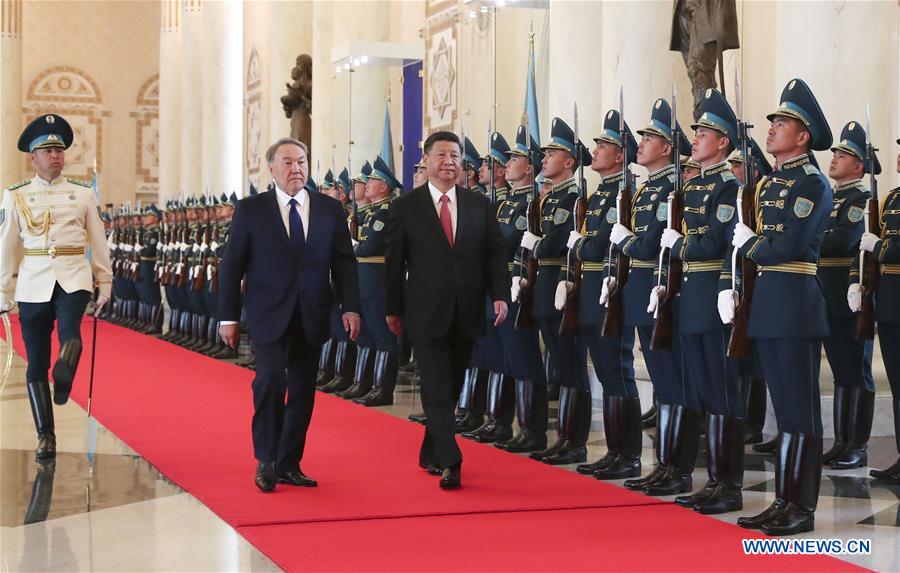China, Kazakhstan to further integrate development strategies as ties flourish

Chinese President Xi Jinping (3rd L) attends the welcoming ceremony hosted by his Kazakh counterpart Nursultan Nazarbayev before their talks in Astana, Kazakhstan, June 8, 2017. (Xinhua/Pang Xinglei)
ASTANA, June 8 (Xinhua) -- Chinese President Xi Jinping and his Kazakh counterpart, Nursultan Nazarbayev, vowed Thursday to accelerate the alignment of their countries' respective development policies and push bilateral ties to a higher level.
During their talks in the Kazakh capital of Astana, the two presidents agreed to further integrate the China-proposed Belt and Road Initiative and Kazakhstan's development strategy of "Nurly Zhol," or "Bright Path" in the Kazakh language.
The two countries will focus on aligning the New Eurasian Land Bridge and the construction of an economic corridor linking China, central Asia and west Asia, with the Kazakh strategy of building an international logistics corridor.
Meanwhile, they will join efforts in connecting the international production capacity cooperation with Kazakhstan's push for industrialization, sharing China's transportation advantages on land and by sea with the world's biggest landlocked country, and linking China's "digital Silk Road" initiative with the "digital Kazakhstan" strategy.
Xi and Nazarbayev also hailed the "great achievements" made in bilateral ties since China and Kazakhstan forged diplomatic relations 25 years ago and decided to push the healthy and stable development of their comprehensive strategic partnership to a higher level, so as to better serve the two peoples.
Xi attributed the development of bilateral ties by leaps and bounds in a relatively short period to the spirit of good neighborliness, mutual benefit and mutual support upheld by the two countries, the principles of mutual respect and equality, as well as their generations of friendship and the concept of common development.
Noting that the political mutual trust between China and Kazakhstan has reached an unprecedented height, with frequent high-level contact and close coordination in international affairs, Xi said China is willing to build a stronger community of shared interests and shared future with Kazakhstan.
Nazarbayev warmly welcomed Xi, saying his visit, on the occasion of the 25th anniversary of the establishment of the diplomatic ties between the two countries, will greatly facilitate the Kazakhstan-China comprehensive strategic partnership.
Noting that bilateral ties are developing with a sound momentum and bear huge potential, Nazarbayev said his country stands ready to deepen win-win cooperation with China in such fields as economy and trade, politics and culture, and carry out closer communication and coordination under the frameworks of the United Nations and the Shanghai Cooperation Organization (SCO).
The building of the Belt and Road Initiative, first proposed by President Xi in Astana, is of major significance, said Nazarbayev.
He pledged to actively participate in cooperation in areas including cross-border transportation, production capacity, industrial parks, finance, agriculture, people-to-people and cultural exchanges under the Belt and Road framework.
The initiative, proposed by Xi in 2013, comprises the Silk Road Economic Belt and the 21st Century Maritime Silk Road, with the aim of building a trade and infrastructure network connecting Asia with Europe and Africa along the ancient trade routes.
Xi and Nazarbayev agreed to maintain close high-level and institutional exchanges, respect each other's choices of development path and policies in accordance with their respective national conditions, support each other's efforts in safeguarding their core interests, and jointly address the challenges to regional security and stability.
On people-to-people and cultural exchanges, the two sides will expand cooperation at local levels, among youths, and in such fields as media, education, health care, sports and tourism. Xi said China supports Kazakhstan in hosting the Expo 2017 Astana.
On major international and regional affairs, the two sides agreed to maintain close communication and strengthen coordination in jointly combating terrorism, extremism and separatism known as the "three evil forces," as well as transnational organized crimes under multilateral frameworks including the UN, the SCO and the Conference on Interaction and Confidence-Building Measures in Asia.
Noting that the SCO has played an important role in international relations, the two presidents agreed to uphold the "Shanghai Spirit" featuring mutual trust, mutual benefit, equality, consultation, respect for diverse civilizations and pursuit of common development, and enhance cooperation in such fields as politics, security, economy and trade, people-to-people and culture under the SCO framework.
Xi praised Kazakhstan for its contribution as the rotating chair of the SCO and in hosting the Expo 2017 Astana, and pledged to work with all parties to implement the Astana summit consensus after China succeeds Kazakhstan as the rotating chair.
For his part, Nazarbayev said Kazakhstan will support China in carrying out the duties of the SCO rotating chair.
The two presidents also signed a China-Kazakhstan joint statement and witnessed the inking of a series of bilateral cooperation documents.
The Chinese president arrived here Wednesday for a state visit to Kazakhstan and the 17th meeting of the Council of Heads of State of the SCO.
The founding members of the SCO are China, Russia, Kazakhstan, Kyrgyzstan, Tajikistan and Uzbekistan. India and Pakistan will complete the process of joining the SCO during the Astana summit, the first time for the SCO to expand membership since its founding in 2001.
China will assume the SCO rotating chair after the Astana summit and will host a summit in 2018.
[ Editor: Wang Peiyao ]





More From Guangming Online
Medics from Fujian leave for Shanghai to aid in battle against COVID-19 resurgence
New int'l land-sea transport service to Indo-China Peninsula launched
Another makeshift hospital under construction in Shanghai
Tourists view tulips in Suiping County, Henan
In pics: blooming gagea flowers on grassland in Zhaosu, Xinjiang
Greek workers stage 24-hour general strike over high prices